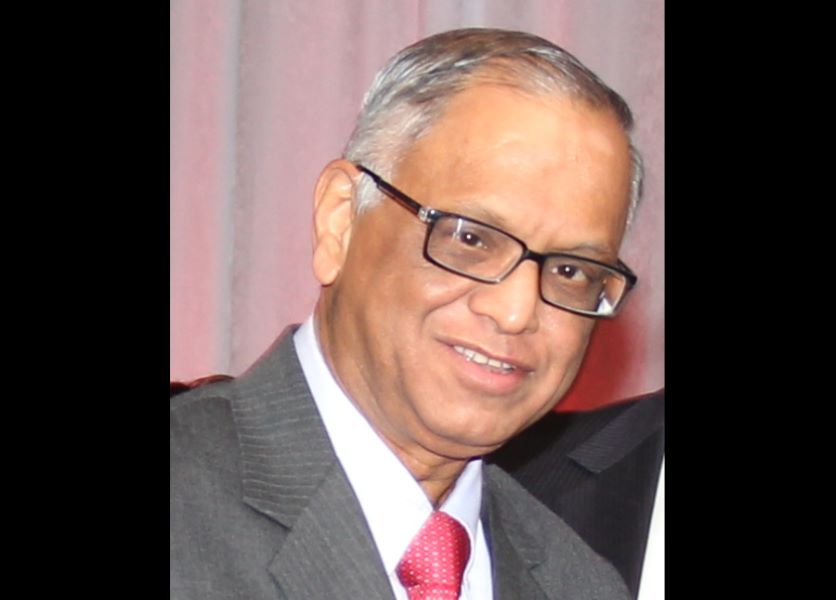 Teachers' training
Teachers' training
India should spend USD one billion per year for 20 years to train teachers
Bengaluru: Infosys co-founder N R Narayana Murthy on Wednesday suggested that India should allocate USD one billion per year for two decades to train primary and secondary school teachers.
According to Narayana Murthy, the country should engage 10,000 retired highly skilled teachers from both the developed world and India, focusing on STEM areas (Science, Technology, Engineering, and Mathematics).
He was speaking at the Infosys Prize ceremony, an annual event that recognises achievements across six categories, honouring scientists, researchers, professors, and economists from India and various parts of the world.
Murthy dwelled on the need to expedite the outcomes of the New Education Policy (NEP) introduced by the Modi government while addressing the audience.
"One possible way of accelerating NEP’s outcome is to invite 10,000 retired highly accomplished teachers from the developed world and from India in STEM areas (Science, Technology, Engineering and Mathematics) to create 2,500 “Train the Teacher” colleges in our 28 states and 8 union territories. The training programme should be year-long," Murthy was quoted as saying by Moneycontrol.
He added that a group of four trainers can train 100 primary school teachers and 100 secondary school teachers in one year.
"We will be able to train 250,000 primary school teachers and 250,000 secondary school teachers every year by this method. These trained Indian teachers can themselves become trainers over a period of 5 years."
"We should pay about $100,000 a year", he said
The two-decade-long programme will cost India $1 billion a year and $20 billion over twenty years.
Murthy said such a cost will not pose a big financial burden on a country like India which is targeting a GDP of $5 trillion soon.
Murthy, being the son of a teacher, underscored the importance of India showing more respect and better remuneration to its teachers and researchers.
He said India should aim to reach the fourth stage in innovation and invention, positioning itself as a creator of new processes, products, and services, similar to the achievements of nations like the United States, many European Union countries, Japan, and Australia.
"We are still in stage 01 in some important areas like design of livable cities, pollution management, traffic management, and providing clean and safe water. India must aspire to move to stage 04 in every area that affects the lives of our poorest citizens in the remotest part of the country," Murthy said..
"Excellence in speed in idea generation and in the execution of those ideas comes from a culture of high aspiration, curious and inquiring minds, a desire to achieve the best global standard of work productivity, the most stringent discipline and hard work, and the mindset of a nation that respects better-performing cultures and is ready to learn from them," he said.
Murthy defined the four stages constituting the lifecycle of invention and innovation that goes on in a nation.
In the initial stage, a nation typically does not innovate or invent.
As it moves to the second stage, it starts manufacturing products and services by adopting inventions and innovations developed by other countries.
Advancing to the third stage, the nation makes use of its higher education and research to innovate and improve existing ideas from other nations, with the goal of achieving superior productivity, quality, cost-efficiency, and comfort.
At the culmination of this development comes stage four, characterised by the nation evolving into an inventor of new processes, products, and services.
He said this would happen only when India improves the quality of primary, secondary, and higher educational institutions and is ready to embrace independent, critical, and analytical thinking.
Infosys Science Foundation (ISF) announced the winners of the Infosys Prize 2023 in six categories – Engineering and Computer Science, Humanities, Life Sciences, Mathematical Sciences, Physical Sciences, and Social Sciences. The Infosys Prize for each category comprises a gold medal, a citation, and a prize purse of USD 100,000 (or its equivalent in INR). The event was hosted at the Infosys Science Foundation’s office in Bengaluru.
The recipients of the Infosys Prize 2023 were chosen from 224 nominations by a panel comprising international jurors.
The winners of the Infosys Prize 2023 were announced by the trustees of Infosys Science Foundation – Kris Gopalakrishnan (President, Board of Trustees), Narayana Murthy, Srinath Batni, K. Dinesh, and S. D. Shibulal.
The Infosys Prize 2023 recipients in the six categories are:
The Infosys Prize 2023 in the ‘Engineering and Computer Science’ category was given to Sachchida Nand Tripathi, Professor of Sustainable Energy Engineering at the Indian Institute of Technology Kanpur (IIT-Kanpur).
The award for ‘Humanities’ was bestowed on Jahnavi Phalkey, Founding Director of Science Gallery Bengaluru.
The ‘Life Sciences’ award was conferred on Arun Kumar Shukla, Professor of Biological Sciences and Bioengineering at IIT-Kanpur.
In the ‘Mathematical Sciences’ category, the prize was given to Bhargav Bhatt, Fernholz Joint Professor at the Institute for Advanced Study and Princeton University.
Support Our Journalism
We cannot do without you.. your contribution supports unbiased journalism
IBNS is not driven by any ism- not wokeism, not racism, not skewed secularism, not hyper right-wing or left liberal ideals, nor by any hardline religious beliefs or hyper nationalism. We want to serve you good old objective news, as they are. We do not judge or preach. We let people decide for themselves. We only try to present factual and well-sourced news.







